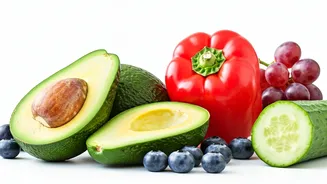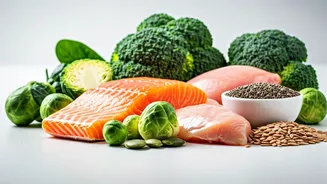Bloating's Sneaky Sources
Bloating can often be attributed to certain food items that trigger digestive upset and gas. These foods can cause water retention, leading to a swollen
or uncomfortable feeling in the abdomen. High sodium content is a common trigger, as it causes the body to retain fluids. Processed foods, which are often high in sodium, are a prime example. These can include anything from pre-packaged snacks to ready-made meals. Another area to consider is the impact of carbonated beverages, such as fizzy drinks. The gas from these drinks can get trapped in the digestive system, contributing to bloating. Additionally, some individuals may experience bloating due to lactose intolerance. Dairy products contain lactose, a sugar that can be difficult for some people to digest, resulting in gas and bloating. Finally, some artificial sweeteners can be problematic as they are not easily absorbed, leading to bloating. Careful attention to these factors can help identify and eliminate bloating triggers.
Sodium's Swelling Effect
Excessive sodium intake is a major contributor to bloating because it promotes water retention within the body. When one consumes high amounts of sodium, the kidneys retain more water to dilute it, leading to a build-up of fluid in the abdomen and other tissues. Processed foods are frequently loaded with sodium, often exceeding daily recommended levels in a single serving. These include salty snacks like chips and pretzels, canned soups, and various frozen meals. Reading food labels carefully is essential to identify hidden sources of sodium, which can contribute to bloating without one even realizing it. Replacing high-sodium foods with fresh, unprocessed options can dramatically reduce water retention and, consequently, bloating. Considering the impact of sodium is a crucial step towards achieving a flatter, more comfortable feeling and improved overall health. Limiting processed foods and being mindful of seasoning choices can make a significant difference.
Carbonation's Bubble Trouble
Carbonated drinks, from sodas to sparkling water, introduce gas into the digestive system, a primary cause of bloating. The bubbles of carbon dioxide that make these drinks fizzy can become trapped, leading to abdominal distension and discomfort. This trapped gas can cause one to feel full and bloated, especially if one drinks these beverages quickly or frequently. The effect can be particularly noticeable for individuals who are sensitive to gastrointestinal discomfort. Switching to alternatives such as plain water or herbal teas can help prevent the build-up of gas. If one enjoys a fizzy sensation, one can opt for water infused with fruit, which provides a refreshing taste without the gas. One can also choose beverages that naturally aid digestion, promoting a comfortable digestive environment. Adjusting one's beverage choices can significantly reduce bloating and improve digestive comfort.
Dairy's Lactose Lament
Lactose intolerance can be a significant trigger for bloating in many individuals. Lactose, the sugar present in dairy products, is difficult for some people to digest due to the deficiency of the enzyme lactase, which breaks down lactose. When lactose is not properly digested, it can cause the production of gas and other unpleasant symptoms. These symptoms include bloating, abdominal cramps, and diarrhea. Individuals who suspect they may be lactose intolerant can try eliminating dairy from their diet to observe any changes. They can switch to lactose-free dairy products or consider plant-based alternatives, such as almond milk or soy yogurt. These substitutes often taste similar to dairy products and can offer similar nutritional benefits without the bloating and discomfort. Consulting with a healthcare professional can confirm lactose intolerance and provide more customized dietary recommendations.
Sweeteners' Side Effects
Artificial sweeteners can contribute to bloating because they are often not fully absorbed in the digestive tract. These sweeteners, common in diet sodas, sugar-free candies, and other processed foods, pass through the gut undigested, where they can be fermented by gut bacteria. The fermentation process produces gas, leading to bloating, abdominal discomfort, and sometimes diarrhea. Additionally, some artificial sweeteners can draw water into the intestines, causing bloating and changes in bowel habits. Reading food labels carefully to identify artificial sweeteners is essential. One can look for names such as aspartame, sucralose, and xylitol. Consider natural alternatives like stevia or erythritol, which some individuals tolerate better. Limiting or eliminating these artificial sweeteners can significantly reduce bloating symptoms and improve overall digestive health. Being mindful of these sweeteners can lead to a more comfortable and less bloated experience.


















